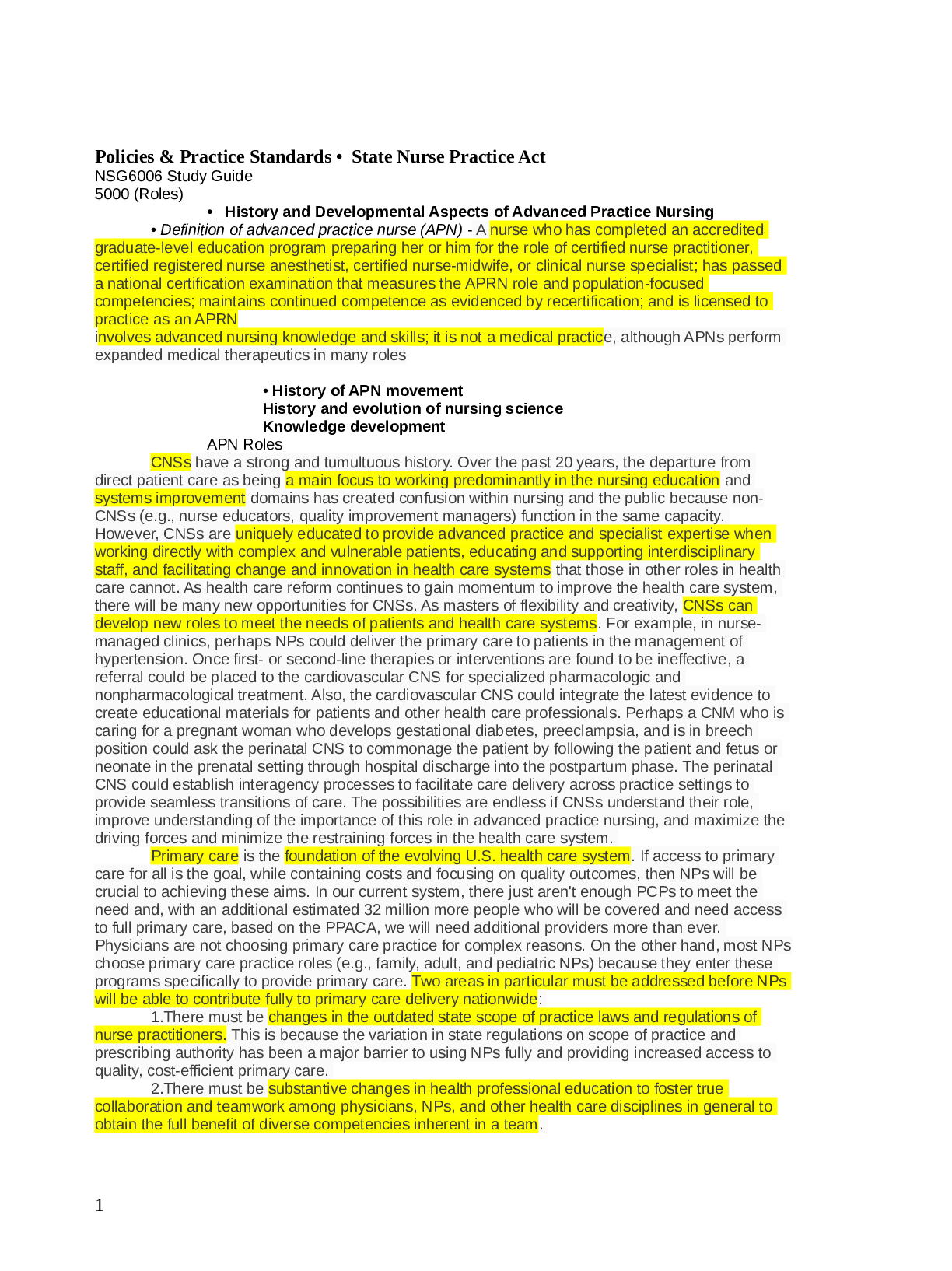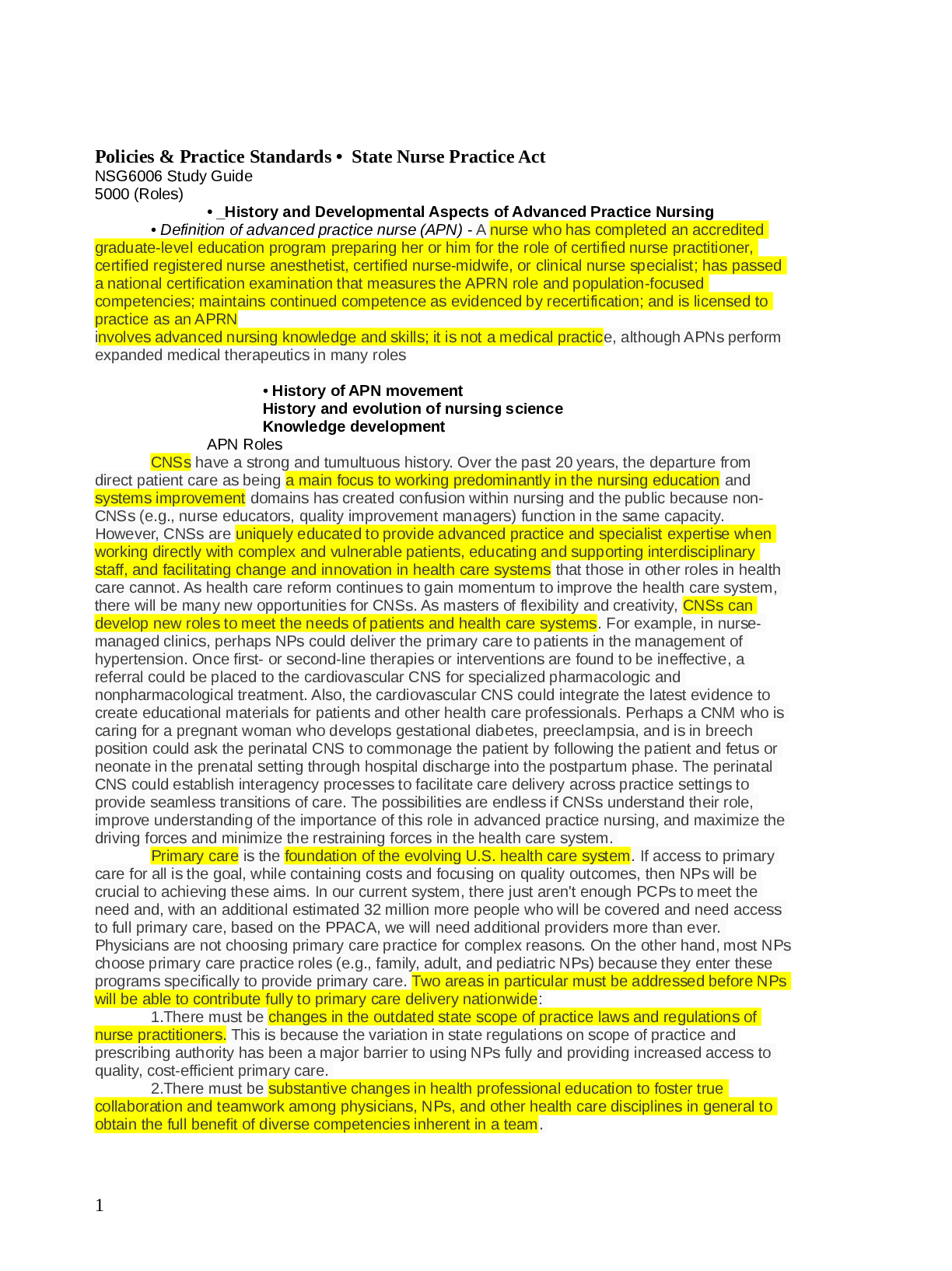• _History and Developmental Aspects of Advanced Practice Nursing
• Definition of advanced practice nurse (APN) - A nurse who has completed an accredited
graduate-level education program preparing her or him for the role of certified nurse practitioner,
certified registered nurse anesthetist, certified nurse-midwife, or clinical nurse specialist; has passed
a national certification examination that measures the APRN role and population-focused
competencies; maintains continued competence as evidenced by recertification; and is licensed to
practice as an APRN
involves advanced nursing knowledge and skills; it is not a medical practice, although APNs perform
expanded medical therapeutics in many roles
• History of APN movement
History and evolution of nursing science
Knowledge development
APN Roles
CNSs have a strong and tumultuous history. Over the past 20 years, the departure from
direct patient care as being a main focus to working predominantly in the nursing education and
systems improvement domains has created confusion within nursing and the public because non�CNSs (e.g., nurse educators, quality improvement managers) function in the same capacity.
However, CNSs are uniquely educated to provide advanced practice and specialist expertise when
working directly with complex and vulnerable patients, educating and supporting interdisciplinary
staff, and facilitating change and innovation in health care systems that those in other roles in health
care cannot. As health care reform continues to gain momentum to improve the health care system,
there will be many new opportunities for CNSs. As masters of flexibility and creativity, CNSs can
develop new roles to meet the needs of patients and health care systems. For example, in nurse�managed clinics, perhaps NPs could deliver the primary care to patients in the management of
hypertension. Once first- or second-line therapies or interventions are found to be ineffective, a
referral could be placed to the cardiovascular CNS for specialized pharmacologic and
nonpharmacological treatment. Also, the cardiovascular CNS could integrate the latest evidence to
create educational materials for patients and other health care professionals. Perhaps a CNM who is
caring for a pregnant woman who develops gestational diabetes, preeclampsia, and is in breech
position could ask the perinatal CNS to commonage the patient by following the patient and fetus or
neonate in the prenatal setting through hospital discharge into the postpartum phase. The perinatal
CNS could establish interagency processes to facilitate care delivery across practice settings to
provide seamless transitions of care. The possibilities are endless if CNSs understand their role,
improve understanding of the importance of this role in advanced practice nursing, and maximize the
driving forces and minimize the restraining forces in the health care system.
Primary care is the foundation of the evolving U.S. health care system. If access to primary
care for all is the goal, while containing costs and focusing on quality outcomes, then NPs will be
crucial to achieving these aims. In our current system, there just aren't enough PCPs to meet the
need and, with an additional estimated 32 million more people who will be covered and need access
to full primary care, based on the PPACA, we will need additional providers more than ever.
Physicians are not choosing primary care practice for complex reasons. On the other hand, most NPs
choose primary care practice roles (e.g., family, adult, and pediatric NPs) because they enter these
programs specifically to provide primary care. Two areas in particular must be addressed before NPs
will be able to contribute fully to primary care delivery nationwide:
1.There must be changes in the outdated state scope of practice laws and regulations of
nurse practitioners. This is because the variation in state regulations on scope of practice and
prescribing authority has been a major barrier to using NPs fully and providing increased access to
quality, cost-efficient primary care.
2.There must be substantive changes in health professional education to foster true
collaboration and teamwork among physicians, NPs, and other health care disciplines in general to
obtain the full benefit of diverse competencies inherent in a team.
Read More


